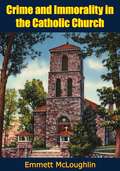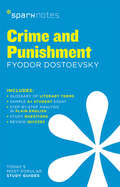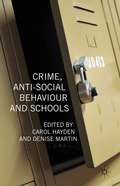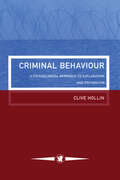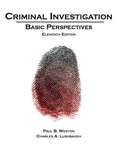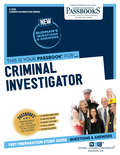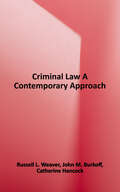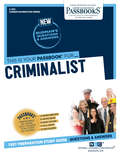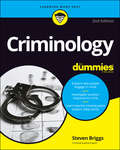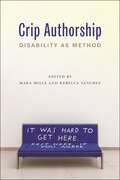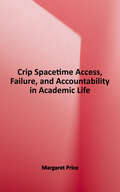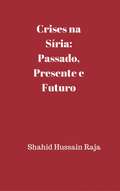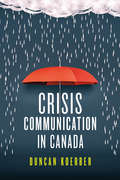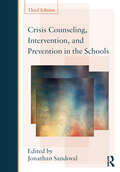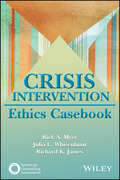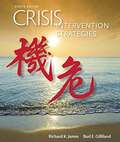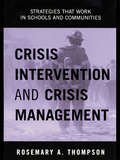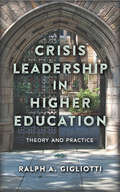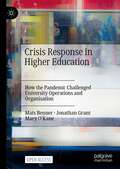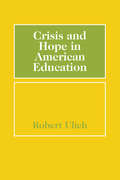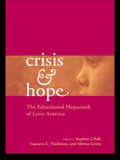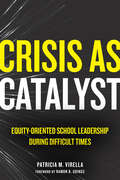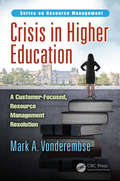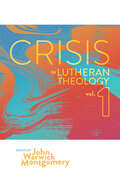- Table View
- List View
Crime and Immorality in the Catholic Church
by Emmett McLoughlinThe stories in this book, which was first published in 1962, centre on the actions of some priests during the 1950s, echoing stories from today’s front pages. However, former Franciscan priest and bestselling author of People’s Padre and American Culture and Catholic Schools, Emmett McLoughlin focus in Crime and Immorality in the Catholic Church is less on the priesthood, and more on the parishioners.To investigate his theory that the Catholic religion promotes criminal behavior rather than preventing it, he conducted a survey of all the prisons in the country in 1960. In every state, the percentage of Catholic inmates was greater than the state’s percentage of Catholics in the population, even using the church’s inflated figures. He then performed a similar survey of institutionalized mental patients, exploring the theory that Catholic beliefs drive people crazy, and came up with the same results.A courageous, thought-provoking book.
Crime and Punishment SparkNotes Literature Guide (SparkNotes Literature Guide Series #23)
by SparkNotesCrime and Punishment SparkNotes Literature Guide by Fyodor Dostoevsky Making the reading experience fun! When a paper is due, and dreaded exams loom, here's the lit-crit help students need to succeed! SparkNotes Literature Guides make studying smarter, better, and faster. They provide chapter-by-chapter analysis; explanations of key themes, motifs, and symbols; a review quiz; and essay topics. Lively and accessible, SparkNotes is perfect for late-night studying and paper writing. Includes:An A+ Essay—an actual literary essay written about the Spark-ed book—to show students how a paper should be written.16 pages devoted to writing a literary essay including: a glossary of literary termsStep-by-step tutoring on how to write a literary essayA feature on how not to plagiarize
Crime, Anti-Social Behaviour and Schools
by Denise Martin Carol HaydenUntil relatively recently in Britain police involvement in schools was generally limited to the odd talk on drugs or 'stranger danger' or much more serious events that were clearly a crime. The concept of 'anti-social behaviour' was rarely used in relation to school children. Public discourse about young people more commonly links their behaviour to a 'lack of discipline in school' or 'poor parenting'; as well as the potential for problem behavior developing into 'anti-social' or 'criminal' behavior. Although schools are one of the safest places for most young people there is a great deal of generalized anxiety about schools and the behaviour of young people in and around schools. This book brings together a number of experts from within the fields of criminology, social policy and educationto take a careful and critical look at these issues, underpinned by a number of original research projects that investigate the experiences of young people, teachers and parents. "
Criminal Behaviour: A Psychological Approach To Explanation And Prevention (Contemporary Psychology Ser. #Vol. 8)
by Clive HollinThis study looks at contemporary psychological research and theory into criminal behaviour and considers the relationship between psychological and criminological theories. At the same time, the book examines the impact of psychology on strategies.
Criminal Investigation: Basic Perspectives (Eleventh Edition)
by Paul B. Weston Charles A. LushbaughThe text focuses on the fundamentals of inquiry and each element of investigation, and reflects the most recent investigative techniques and technology, and features real-life case studies to help students develop their ability to analyze, evaluate, and reason.
Criminal Investigator: Passbooks Study Guide (Career Examination Series)
by National Learning CorporationThe Criminal Investigator Passbook® prepares you for your test by allowing you to take practice exams in the subjects you need to study. It provides hundreds of questions and answers in the areas that will likely be covered on your upcoming exam.
Criminal Law: A Contemporary Approach (Interactive Casebook Ser.)
by Russell L. Weaver Catherine Hancock John M. BurkoffThis state-of-the-art casebook is both easy and fun to use. It is designed to give you the basis for an enjoyable, comprehensive learning experience for your students, providing you with the sort of piquing materials that should prompt interested and insightful classroom discussion. The focus here is on teach ability, rather than encyclopedic coverage of the field. Many modern, cutting-edge cases and related features are included, as well as the classic decisions, making it possible for you to show students the most current issues in the law and the traditional doctrinal underpinnings of this area. Numerous problem-style hypotheticals are also included throughout, serving to stimulate and encourage thought and discussion but also to help you focus your students on practice-oriented, analytical skills. The book also contains updated cases that bring the book entirely up-to-date.
Criminalist: Passbooks Study Guide (Career Examination Series)
by National Learning CorporationThe Criminalist Passbook® prepares you for your test by allowing you to take practice exams in the subjects you need to study. It provides hundreds of questions and answers in the areas that will likely be covered on your upcoming exam.
Criminology For Dummies
by Steven BriggsExplore the world of crime and punishment Police, forensics, and detective stories dominate our TV screens and bookshelves—from fictional portrayals such as Silence of the Lambs and Law and Order to lurid accounts of real-life super-criminals like Pablo Escobar and Al Capone. As well as being horribly fascinating, knowledge of what makes criminals tick is crucial to governments, who spend billions of dollars each year trying to keep their people safe. Criminology brings disciplines like psychology, biology, and economics together to help police and society solve crimes—and to prevent them before they even happen. The new edition of Criminology For Dummies shines a light into the dark recesses of the criminal mind and goes behind-the-scenes with society’s response to crime, putting you right on the mean streets with cops and criminals alike. Along the way, you’ll learn everything a rookie needs to survive, including basic definitions of what a crime is and how it’s measured; common criminal motivations, thinking, and traits; elementary crime-solving techniques; the effects on and rights of victims; and more. Understand types of crime, from white-collar to organized to terror attacks Follow law-enforcement officials and agencies as they hunt the bad guys Meet key players in criminal justice and see how and why the guilty are punished Check out jobs in the field Whether you plan to enter the criminal justice field or just want to know more about what turns some people to the dark side—and how the thin blue line fights back—this is your perfect guide to criminology basics.
Criminology, M. A. Final Year Sociology Paper-X, SDE, AU
by D. HarinarayanaThis is the prescribed text book for students pursuing MA Final sociology at School Of Distance Education, Andhra University for the subject of Criminology
Crip Authorship: Disability as Method
by Mara Mills and Rebecca Sanchez2024 Daniel E. Griffiths Research Award Winner2024 Outstanding Academic Title, given by Choice ReviewsAn expansive volume presenting crip approaches to writing, research, and publishing. Crip Authorship: Disability as Method is an expansive volume presenting the multidisciplinary methods brought into being by disability studies and activism. Mara Mills and Rebecca Sanchez have convened leading scholars, artists, and activists to explore the ways disability shapes authorship, transforming cultural production, aesthetics, and media.Starting from the premise that disability is plural and authorship spans composition, affect, and publishing, this collection of thirty-five compact essays asks how knowledge about disability is produced and shared in disability studies. Disability alters, generates, and dismantles method. Crip authorship takes place within and beyond the commodity version of authorship, in books, on social media, and in creative works that will never be published. The chapters draw on the expertise of international researchers and activists in the humanities, social sciences, education, arts, and design. Across five sections—Writing, Research, Genre/Form, Publishing, Media—contributors consider disability as method for creative work: practices of writing and other forms of composition; research methods and collaboration; crip aesthetics; media formats and hacks; and the capital, access, legal standing, and care networks required to publish. Designed to be accessible and engaging for students, Crip Authorship also provides theoretically sophisticated arguments in a condensed form that will make the text a key resource for disability studies scholars. Essays include Mel Y Chen on the temporality of writing with chronic illness; Remi Yergeau on perseveration; La Marr Jurelle Bruce on mad Black writing; Alison Kafer on the reliance of the manifesto genre on disability; Jaipreet Virdi on public scholarship for disability justice; Ellen Samuels on the importance of disability and illness to autotheory; Xuan Thuy Nguyen on decolonial research methods for disability studies; Emily Lim Rogers on virtual ethnography; Cameron Awkward-Rich on depression and trans reading methods; Robert McRuer on crip theory in translation; Kelsie Acton on plain language writing; and Georgina Kleege on description as an access and aesthetic technique.
Crip Spacetime: Access, Failure, and Accountability in Academic Life
by Margaret PriceIn this book, the author intervenes in the competitive, productivity-focused realm of academia by sharing the everyday experiences of disabled academics. Drawing on more than three hundred interviews and survey responses, she demonstrates that individual accommodations―the primary way universities address accessibility is to impede access rather than enhance it. She argues that the pains and injustices encountered by academia’s disabled workers result in their living and working in realities different from nondisabled colleagues: a unique experience of space, time, and being that she theorizes as “crip spacetime.” She explores how disability factors into the exclusionary practices found in universities, with multiple marginalized academics facing the greatest harm. Highlighting the knowledge that disabled academics already possess about how to achieve sustainable forms of access, the author boldly calls for the university to move away from individualized models of accommodation and toward a new system of collective accountability and care.
Crises na Síria: Passado, presente e futuro
by Gabriel Ribeiro Shahid Hussain RajaCrises na Síria apresenta o contexto das crises recentes da Síria, o cenário presente e o futuro. O livro aborda a natureza e origens destas crises, no contexto geopolítico do Oriente Médio. Em seguida, enumera os interesses dos poderes globais e regionais e como eles estão reagindo nesta situação em movimento, para concluir com possíveis desdobramentos e sugestões para o futuro.
Crisis Communication in Canada
by Duncan KoerberPrivate companies that respond poorly to a crisis may go bankrupt, wiping out investments and jobs. Charities that respond poorly to a crisis may lose donations, ending support for the most vulnerable. Professional athletes, religious leaders, CEOs, and politicians who respond poorly to a crisis may lose their long-standing careers and the respect of their colleagues, supporters, fans, and customers. This book offers both theory and practical help for organizations and professionals to deal effectively with crises. Crisis communication lessons have typically been the purview of public relations professionals. However, since the 1990s there has been a growing body of scholarly research on the topic. Crisis Communication in Canada offers a unique scholarly and professional contribution, synthesizing recent research and providing a context for practical advice. Written in clear and concise style, directed at beginners but rooted in research, this book will offer instructors and students a unique resource for the study and practice of crisis communication.
Crisis Counseling, Intervention and Prevention in the Schools (Consultation, Supervision, and Professional Learning in School Psychology Series)
by Jonathan SandovalSince the first edition was published in 1988, the role of crisis intervention and prevention has become central to mental health professionals working in the schools. Disasters such as hurricane Katrina, terrorist attacks both in this country and around the world, and various school shootings have greatly increased school crisis research and policy development. This book is designed for an introductory graduate course taken by students in school psychology, school counseling, and school social work. Section I provides a crisis response overview, section II deals with crises for children and adolescents and section III covers crises that manifest in adolescence. Discussions of the 16 most prevalent types of crises are covered in sections II and III and include their characteristics, causes, interventions, and preventive programs. All chapters will be updated, six heavily revised or totally rewritten by new authors, and two new chapters (chapters 8 & 19) have been added.
Crisis Intervention Ethics Casebook
by Rick A. Myer Richard K. James Julia L. WhisenhuntThe fast-paced, unpredictable, and high-risk nature of crisis intervention creates critical ethical dilemmas that can result in personal harm and professional liability if not handled appropriately. Applying a traditional model of ethical decision-making is often impractical when time is limite and decisions must be made quickly. This counseling tool kit offers a new operational approach for integrating ethical decision-making in crisis intervention. Following detailed discussions of crisis intervention within the framework of realtional-cultural theory, a triage assessment system, and an original ethical decision-making protocol, nine diverse case studies in hospital, telebehavioral health, school, clinical, and public settings are presented. Students and practitioners will build a repertoire of ethical decision-making skills to de-escalae crisis incidents and provide an appropriate level of support to individuals experiencing crisis. *Requests for digital versions from ACA can be found on www.wiley.com *To purchase print copies, please visit the ACA website here *Reproduction requests for material from books published by ACA should be directed to permissions@counseling.org
Crisis Intervention Strategies
by Richard James Burl GillilandThis authoritative, best-selling text presents the latest skills and techniques for handling crisis situations. <p><p>The authors' task model clearly illustrates and elucidates the process of dealing with people in crisis, from defining the problem to obtaining commitment. Using this model, the authors build specific strategies for handling a myriad of different crisis situations, accompanied in many cases with the dialogue that a practitioner might use when working with the individual in crisis. This book puts you on the front lines with the crisis worker throughout the chapters, and then illuminates the techniques and strategies the worker used. <p><p>New videos in MindTap (available with the text) correlate with the text and demonstrate crisis intervention techniques, ensuring that you not only understand the theoretical underpinnings of crisis intervention theories, but also know how to apply them in crisis situations.
Crisis Intervention and Crisis Management: Strategies that Work in Schools and Communities
by Rosemary A. ThompsonThis book discusses steps helping professionals should take in order to prepare for a crisis in their schools and community. The author introduces a Crisis Management Plan, which discusses ways to restore a school/community to its pre-crisis equilibrium. The author also includes information on how schools should talk to media personnel and parents in times of a crisis, checklists, assessment instruments, and sample documentation forms that can be used in times of a crisis.
Crisis Leadership in Higher Education: Theory and Practice
by Ralph A GigliottiThere was a time when crises on college and university campuses were relatively rare. Much has changed, and it has changed quite rapidly. Rather than being isolated incidents requiring the sole attention of presidents, chancellors, or communication professionals, the proliferation of crises across campuses means that crisis leadership has now become fundamental to the work of university personnel across levels, disciplines, and institutions. Drawing upon the findings of forty interviews with senior leaders from ten major research universities across the United States and a content analysis of over one thousand articles from a variety of news outlets, Crisis Leadership in Higher Education presents a theory-informed framework for academic and administrative leaders who must navigate the institutional and environmental crises that are most germane to institutions of higher education. The perspectives offered in this book remind us that it is in the chaos and uncertainty of crisis that leadership becomes most visible and most critical.
Crisis Response in Higher Education: How the Pandemic Challenged University Operations and Organisation
by Jonathan Grant Mats Benner Mary O’KaneThis open access book explores the impact of Covid-19 on universities, and how students, staff, faculty and academic leaders have adapted to and dealt with the impact of the pandemic. Drawing on experiences from Britain, Australia and Sweden, it showcases how Covid has challenged routines and procedures in universities, and thrown them into a disarray of ever-changing events and short-term adaptations. The authors pay particular attention to how students, staff, faculty, and leaders have coped with Covid, through a series of autobiographical portraits of their strains but also heroic efforts in the harshest of circumstances. This important book explores the exceptional ramifications of the pandemic but also how universities may contribute to a fairer and more robust society and concludes with a set of prescriptions for universities that aim to be proactive and resilient forces in society. It will be of interest to scholars interested in higher education, governance and organizational studies.This is an open access book.
Crisis and Hope in American Education
by Robert UlichThis book evaluates the educational system of the United States from schools for the young up to universities and various forms of adult education. It is not confined to the evaluation of intellectual achievement. Rather it tries to arrive at some judgment as to whether schools help people acquire the degree of maturity necessary for participation in the work of a nation called upon to assume world responsibilities.Education, rightly conceived, is the process by which a growing person, according to his individual capacity, is prepared to understand himself, his place in society, his relation to the universe, and to act upon this understanding. A nation, to whatever extent it can afford to do so, should help future generations to strive for such achievements. But although this obligation is generally accepted by the American citizen, its practical requirements are still not fully understood.A classic soon after its original publication, this book is timelier today than ever. The author convincingly articulates the view that all our efforts at raising the intellectual and moral standards in our high schools are doomed to failure unless we boldly pair the right subject with the right talent. He demonstrates how we can achieve this without rejecting the precious heritage that is our tradition of free secondary schooling for all who can profit by it: his goal is nothing less than the creative combination of quality and justice in education.Ulich's prescriptions for education are bold and prac1/4tical. The boldness is best characterized by his contro1/4versial suggestion that the emotional sphere serves as the means of unifying the highly diverse American society. We see the influence of modern theory and its disenchantment with the merely intellectual theory as a basis for understanding, communication, and meaning. The institution that Ulich proposes is an "ideal" one, but it is described in considerable detail. Its buildings, facilities, curriculum, and informal programs are designed to provide shared emotional experiences while retaining the need for intellectual differentiation. 1/4
Crisis and Hope: The Educational Hopscotch of Latin America (Reference Books in International Education)
by Stephen J. Ball Gustavo E. Fischman Silvina GvirtzThis book seeks to offer the most up-to-date and relevant sample of contemporary research on Latin American education, by inviting the reader to understand the complexities, heterogenetics, nightmares, dreams, crisis and promises of education in the region.
Crisis as Catalyst: Equity-Oriented School Leadership During Difficult Times
by Patricia M. VirellaA flexible framework that enables school leaders to proactively set up systems and structures that will support equitable responsiveness during crises
Crisis in Higher Education: A Customer-Focused, Resource Management Resolution (Resource Management)
by Mark A. VonderembseWhile many students, parents, educators, and organizations who hire their graduates hold US universities in high regard, the cost of higher education has risen much faster than the rate of inflation. High costs, in turn, have severely limited access to higher education for large portions of the US population or caused graduates and those who fall short of graduation to face substantial student loan debt. This book examines the root causes of these underlying problems and offers a comprehensive, easy-to-understand, high-impact solution. The book identifies actions that improve higher education outcomes including lower tuition costs, better access for student from low and middle income homes, faster throughput, fewer dropouts, and better job opportunities for graduates. It links a real and implementable solution to the underlying problems and their root causes. Upon finishing this book, readers should understand why the performance of higher education needs to improve and have solid ideas about how to fix it. The book focuses on public universities, but the ideas discussed are also applicable to private for-profit and not-for-profit universities. The writing style is simple and direct.
Crisis in Lutheran Theology, Vol. 1: The Validity & Relevance of Historic Lutheranism vs. Its Contemporary Rivals (Crisis in Lutheran Theology)
by John Warwick MontgomeryAll Three volumes deal with the issue of biblical inerrancy (that the Bible is completely true and accurate, not only when it speaks to ideas of religious belief, but also when it speaks about factual elements of history and science, properly understood). This issue rocked the Lutheran Church Missouri Synod back in the late 1960s and early 1970s, prompting the release of the first two volumes. Volume one consists of essays by John Warwick Montgomery himself, and is addressed primarily to theologians. Volume two consists of an anthology by eight separate Lutheran contributors and is addressed to laymen as well as professional theologians. Volume 3 is new, never before published material and consists of essays by Dr. Montgomery outlining a new challenge along the same lines. Dr. Jeffery Kloha suggested a few years ago with the latest critical edition of the New Testament (Nestle-Aland 28th Edition), because of the interchangeability of some variant readings, that we now had a "plastic text". Dr. Montgomery goes up against this assertion with everything he has. Though obviously addressing themselves primarily to Lutheranism, the materials are, to a large degree, equally applicable to many of the other Christian communions and will be found to be extremely valuable in assessing the needs of a variety of denominations.
